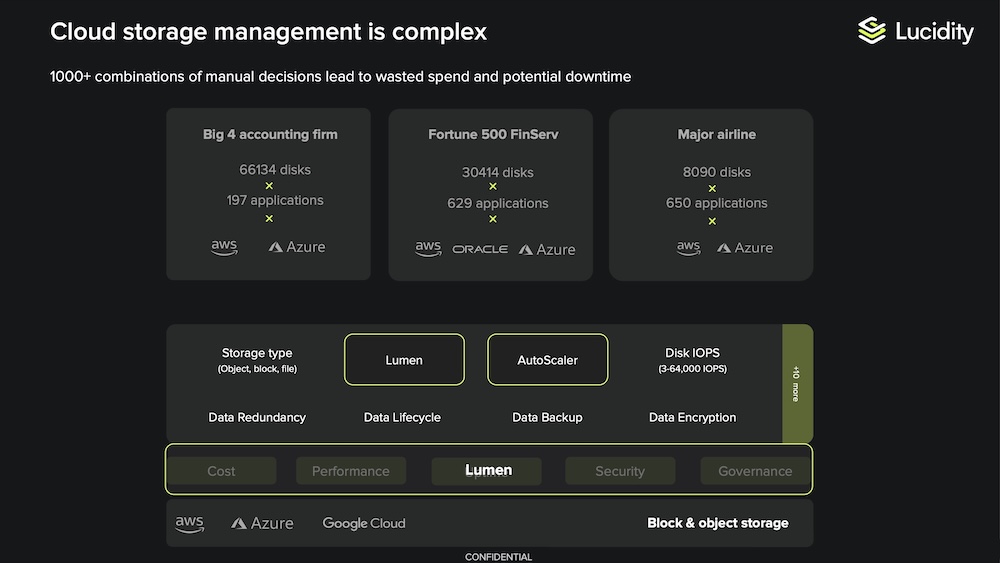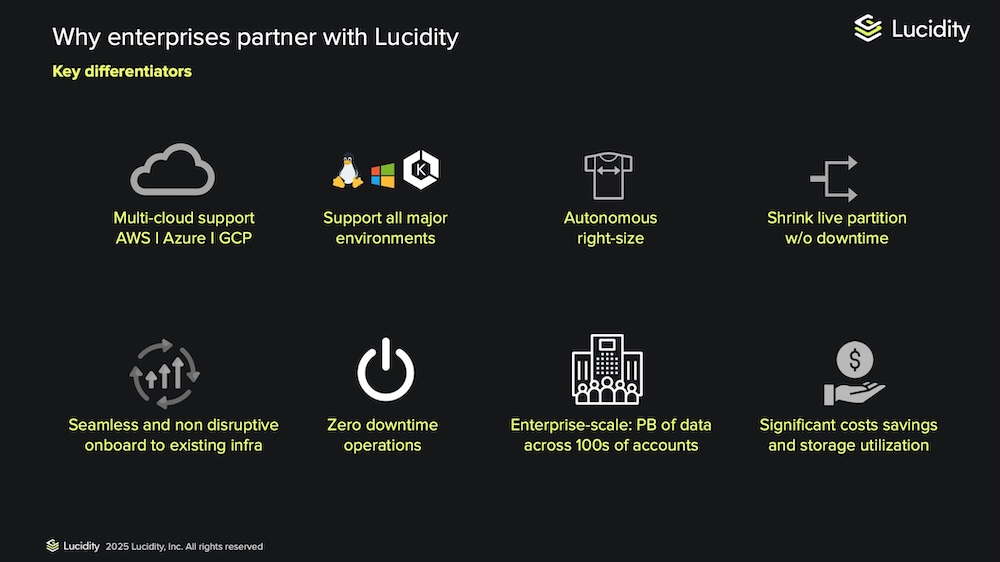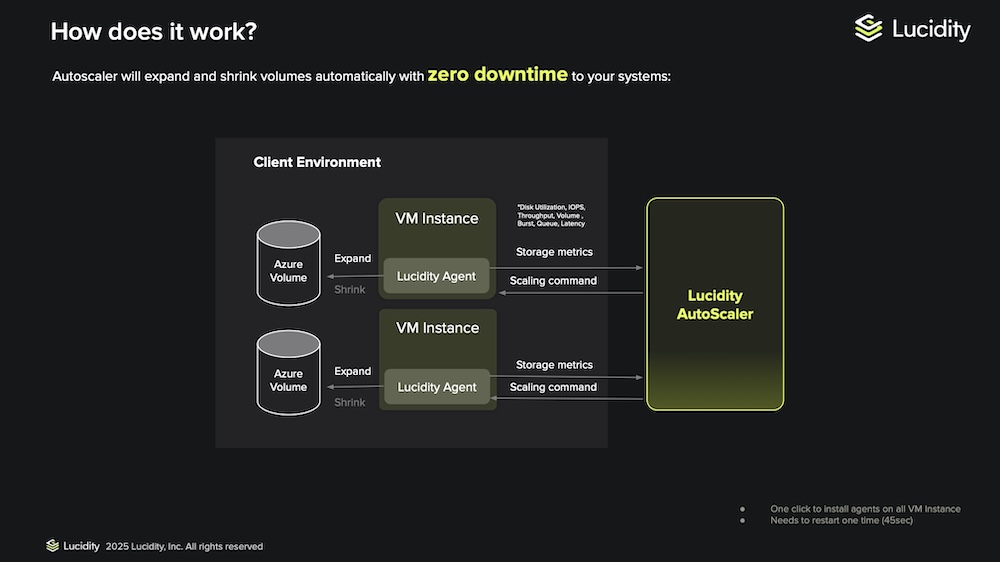Startup Profile: Lucidity
Optimization of cloud storage utilization and associated cost
By Philippe Nicolas | July 8, 2025 at 2:02 pmCompany name:
Lucidity
HQ and offices:
HQ in Bengaluru, India, with presence across the US, UK, and the Middle East
Website:
lucidity.cloud
Date founded:
2021
Founders and leaders:
 Nitin Bhadauria, Co-Founder
Nitin Bhadauria, Co-Founder
LinkedIn profile
Nitin Bhadauria co-founded Lucidity with a clear mission: to simplify cloud storage management at scale. A serial entrepreneur, Nitin previously co-founded Fungru and Alitum Solutions, and brings deep experience in building and scaling startups.
Before Lucidity, Nitin was part of the early team at Tracxn, where he scaled the GTM organization to over 80 people, driving multi-million dollar revenue across 30+ countries—including the U.S., Europe, and Southeast Asia—and played a key role in taking the company public.
At Lucidity, Nitin leads all go-to-market functions, combining product vision with execution. He is an alumnus of the Indian Institute of Management Bangalore (IIM-B).
 Vatsal Rastogi, Co-Founder
Vatsal Rastogi, Co-Founder
LinkedIn profle
Vatsal Rastogi is the co-founder and technical driving force behind Lucidity, with a proven track record of building software that simplifies complex infrastructure challenges. With deep experience across both AWS and Azure, Vatsal has seen the realities of public cloud from both sides—first as a software engineer at Microsoft Azure, and later as a user of AWS at Swiggy—giving him unique insight into the gaps and inefficiencies in cloud storage management.
Vatsal holds an M.Sc. (Tech) in Information Systems from the prestigious Birla Institute of Technology and Science (BITS), Pilani.
Click to enlarge
Financial funding:
$31M (Series A)
Employees numbers:
100+
Revenue:
As a private company, Lucidity does not disclose revenue figures. However, since going GA with its first offering, the business has experienced explosive growth—quadrupling revenue, customer count, and continuing to expand across all major functions.
Technology:
Cloud storage management and optimization
Products:
- Lucidity AutoScaler: Industry’s first fully managed SaaS storage management solution that sits between applications and block cloud storage, delivering real-time, autonomous storage optimization across AWS, Azure, and Google Cloud – without downtime or changes to existing architecture. It eliminates manual resizing, reduces over provisioning, ensures uptime, and dramatically lowers cloud storage cost.
- Lucidity Lumen: An intelligent disk tiering solution that delivers global visibility, actionable recommendations, and one-click execution to right-size cloud disk tier, without downtime or manual effort required. Lumen helps enterprises improve application performance while reclaiming cloud budget and engineering hours.
Click to enlarge
Release and Roadmap:
Lucidity has maintained a strong pace of innovation—both by launching new solutions and continuously strengthening existing ones. As of June 2025, Lucidity offers three core products: AutoScaler, Lumen, and Assessment—all cloud-native and delivered as SaaS.
As the latest offering, Lucidity Lumen officially went GA in June 2025. The company follows a monthly release cycle focused on delivering high-quality, non-disruptive updates.
The product roadmap is aligned with the 10–15 key storage challenges faced by enterprise customers. The company began by tackling storage provisioning and disk tiering, and is committed to expanding its capabilities to address the broader spectrum of issues in cloud storage optimization.
Pricing model and price:
Lucidity uses a straightforward, per-TB pricing model for both AutoScaler and Lumen. Customers pay only for actual storage utilization—not provisioned capacity—which helps significantly reduce overall cloud spend.
Solutions can be deployed either as a Lucidity-hosted or self-hosted plan, depending on customer preference.
Lucidity also offers a free Assessment tool, allowing organizations to identify storage inefficiencies and optimization opportunities within their cloud environments.
Lucidity on Microsoft Azure marketplace and AWS marketplace.
GTM:
Lucidity is a channel-first company, partnering with resellers across North America, EMEA, and APJ to deliver its solutions globally. Lucidity is also available via AWS, Azure, and GCP marketplaces.
Customers:
Lucidity has seen strong adoption among mid-to-large enterprises, particularly in industries like financial services, retail, and technology. Notable customers include one of the largest American airlines, leading IT management firms, and brands such as Brook Automation, Dometic, Upstart, and Cost Plus World Market, among others.
Workloads/Use cases/Applications:
- Cloud storage management
- Cloud storage provisioning
- Cloud disk tiering
- Cloud storage visibility
Target market:
Almost every organization operating in the public cloud has significantly over provisioned their disk capacity and performance tier in an effort to meet peak performance demands. In reality, most are utilizing only 30% of their storage capacity, and more than 50% of disks are mis-tiered across storage types.
Mid-to-large enterprises spending $20K per month or more on cloud block storage and looking to free up cloud budget are ideal candidates for Lucidity’s solutions. IT leaders, FinOps teams, and DevOps practitioners are especially drawn to Lucidity’s technology to help meet their cloud optimization and cost-efficiency KPIs.
Competition:
Lucidity doesn’t have a direct competitive vendors for our enterprise customers, as Lucidity is the only multi-cloud, application-agnostic solution available today. Zesty and Datafy take a similar approach to Lucidity, but for a limited scope (covering only Kubernetes and AWS, respectively), so Lucidity does not often run into them in enterprise-scale environments with their broader cloud estates. They don’t do automated live volume shrinking, support Windows OS and are limited to a single cloud provider, which are a major appeal for our customers.
Click to enlarge
Comments
Supporting the 3 major clouds, AutoScaler is based on agent deployed with each VM. Coupled with a central control center, each agent sits outside of the data path and doesn't block or stop IO/s and production in case of failure. After potential conversion to Btrfs, the development team leverages its sub-volumes architecture, offering an interesting granularity that makes incremental addition or remove very easy and transparent. Most of deployments are on Linux and for Windows, the engineering team uses NTFS.
Click to enlarge
It's interesting to see that engineers who spend time at cloud providers like Vatsal Rastogi at Azure or Zivan Ori at AWS, following the sale of E8 Storage, came back on business with a new story and the idea about right sizing cloud storage volumes.














 Subscribe to our free daily newsletter
Subscribe to our free daily newsletter

